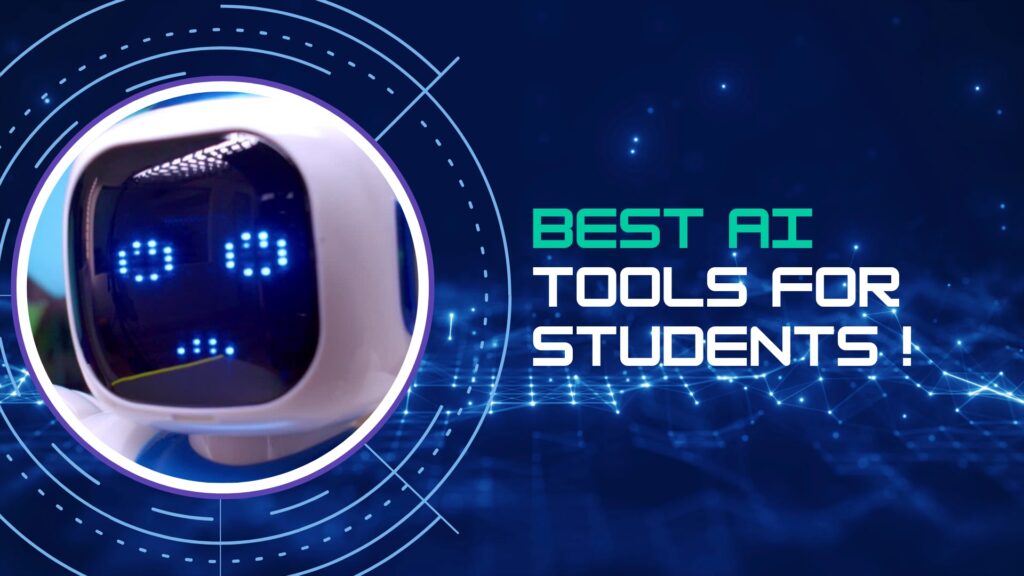In today’s hectic academic life, students have a lot of activities to manage exams and homework, internships and jobs. And amidst all that, artificial intelligence (AI) comes along as a++\
Homogeneous buddy to students of all ages. With the correct AI tools, students can learn smarter rather than work harder increasing productivity, enhancing performance, and making time management easier.
Whatever level of study you are on at high school, college, or working towards higher degrees, the inclusion of AI-powered apps and platforms in what you do can help significantly lower stress levels and enhance outcomes. Here, we’ll discuss the top AI student tools in 2025, ranging from note-taking to researching, writing, scheduling, and preparing for exams.
Why Students Need AI Tools
Prior to delving into the specifics of the tools, it’s critical to understand their importance in the current environment:
- Efficiency: AI can automate repetitive processes like formatting, proofreading, and summarizing materials.
- Better Understanding: Through customization and real-time feedback, tools can translate complex ideas into simpler language.
- Scheduling: AI can help schedule study sessions and meet deadlines.
- ChatGPT: Some AI applications use these tools to read thousands of documents to provide precise, relevant information at once.
In light of these advantages, following ChatGPT are some of the best AI tools every student should make use of.
1. Grammarly: The Best Writing Assistant
Best for: Academic essays, research papers, emails, and homework.
Grammarly is better than a spell checker. It applies artificial intelligence to examine your writing based on grammar, tone, clarity, and interest. It provides instant feedback on how you can enhance sentence structure, eliminate redundancy, and write formally in academic writing.
Features:
- Grammar and punctuation correction
- Plagiarism check (Premium version)
- Suggestions for clarity and conciseness
Why Students Love It: Grammarly enables students to sound professional and also avoid cringe-worthy errors. Whether you’re writing a paper or a note to your teacher, Grammarly helps you write more professionally.
2. Notion AI – Organize Study Material like a Pro
Best suited for: Notes, to-do lists, project management, and teamwork.
Students love Notion because it is very versatile. With its new capability, Notion AI can now construct study templates, essay outlines, and note summaries.
Features:
- AI-assisted note summaries
- Daily study planners
- Shared group project pages
- AI content generation
Why It Matters: It’s an amazing one-stop workspace where you can have all your assignments, deadlines, lecture notes, and study guides in one place.
3. ChatGPT – Your AI Study Buddy
Best for: Explaining concepts, brainstorming, coding help, and writing assistance.
OpenAI’s ChatGPT has transformed how students interact with information. Instead of googling for hours, students can ask ChatGPT questions in plain language and get clear, easy-to-understand answers instantly.
Use Cases:
- Simplifying difficult topics
- Write essays or assignment papers
- Mastering programming language
- Project brainstorming
Pro Tip: Always proofread AI-written work before submission, particularly for academic integrity.
4. QuillBot: Academic Paraphrasing Simplified
Best for: Replacing, summarizing, and rephrasing text.
QuillBot is a revolutionary AI-based paraphrasing software that enables students to write ideas differently without changing the sense of them. It is extremely useful when you are struggling to rephrase academic material for assignments or research work.
Key Features:
- Paraphrasing in multiple tones (Standard, Formal, Creative)
- AI Summarizer
- Grammar checker
Why It’s Effective: It prevents plagiarism while enhancing vocabulary and writing abilities.
5. Otter.ai: Transcribe Lectures in Real-Time
Suitable for: Transcription of lectures, group discussions, and Zoom meetings.
Otter.ai records and transcribes audio in real-time. Students can listen rather than note-taking, and subsequently refer to accurate transcripts.
Features:
- Real-time transcription
- Speaker identification
- Zoom and Google Meet integration
Bonus Advice: Record Otter’s brainstorming sessions or peer discussions for later listening.
6. Wolfram Alpha: Reason Math & Science Problems Out
Best for: Mathematics, statistics, engineering, physics, and data analysis
Wolfram Alpha is an über-calculator. It doesn’t only provide answers but demonstrates, step by step, how to solve complex problems.
Highlights:
- Detailed solutions with explanations
- Visual graphs and simulations
- Computational intelligence for STEM fields
Student Benefit: Helps you understand the process behind the solution, which is crucial for exam success.
7. Perplexity AI: Smarter Academic Research
Best for: Gathering credible information for research papers and presentations.
The best features of search engines and AI chatbots are combined in Perplexity AI. Instead of just summarizing articles, it provides source links, citations, and a wide range of answers on one topic.
Why Use It:
- Academic research assistance
- Source referencing
- Short and long-form answers
Advantage: Ideal for students working on literature reviews or thesis projects who want verifiable information.
8. Khan Academy’s AI Tutor: Learn with Confidence
Best for: Self-paced learning in school subjects.
Khan Academy’s integration with GPT-4 has brought in an AI tutor with a personalized avatar called Khanmigo. The AI speaks to students, clarifies concepts, and assists in solving science, math, and humanities-related problems.
Benefits:
- Guided learning paths
- Practice questions with solutions
- Real-time tutoring assistance
Result: Makes studying more interactive and less intimidating for students at any level
9. Elicit: AI Research Assistant for Students
Elicit enables researchers to develop their research questions in straightforward, informal language, which aids in the discovery of pertinent research publications. College students find it invaluable, particularly when it comes to writing their theses and dissertations.
Cool Features:
- Summarizes academic articles
- Suggests related questions
- Citation tracking
Student Advantage: Saves time spent searching through academic databases manually.
10. Tactiq Recording Meeting Highlights with AI
Best suited for: Recording and summarizing online classes or meetings.
Tactiq is integrated with Google Meet and Zoom to record live subtitles and creates summaries, action items, and meeting minutes.
Student Use Case: Remembers what happened during virtual group projects or recorded classes.
How to Select the Most Suitable AI Tools
With so many AI tools out there, the students have to be confused as to which ones they need to use. Here are three easy ideas:
- Start with Your Weakness: Use QuillBot or Grammarly if you have trouble writing. If you’re not good at planning, start with Notion AI.
- Blend and Combine: Don’t depend just on one tool. Using Notion for organization, Grammarly for corrections, and ChatGPT for brainstorming results in a comprehensive study toolkit.
- Remain Ethical: AI should be used as a guide, not as a substitute for human labor.
Concluding Reflections
AI in education is not a trend but the revolution of how students learn, develop, and thrive. These AI tools can revolutionize your college experience by making you less stressed, more productive, and better understand. But as with anything, their power is dependent on your use.
Visit these websites, identify those that are aligned with your study inclination, and allow AI to take the load off while you concentrate on what matters most learning.



